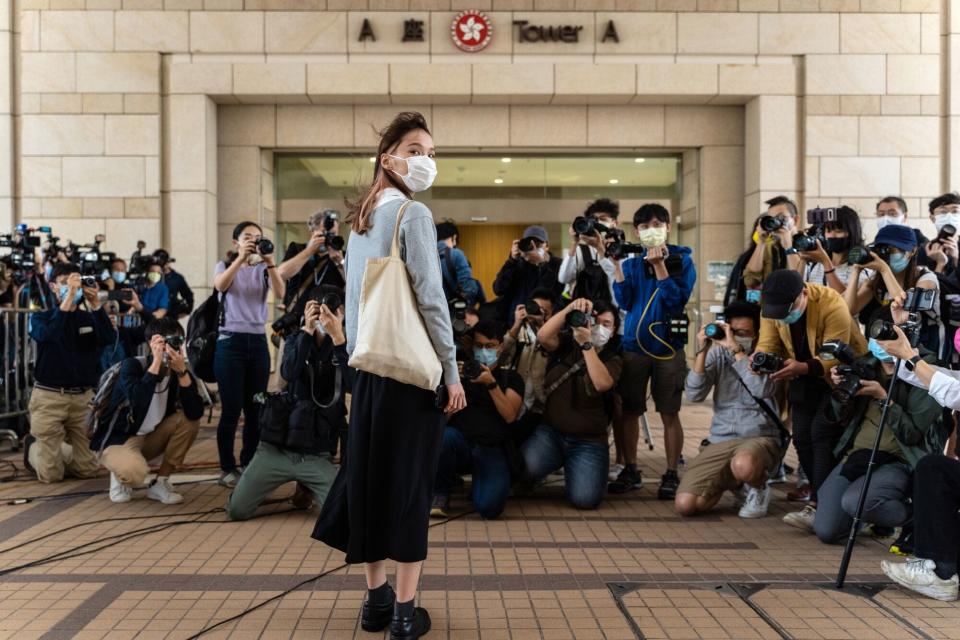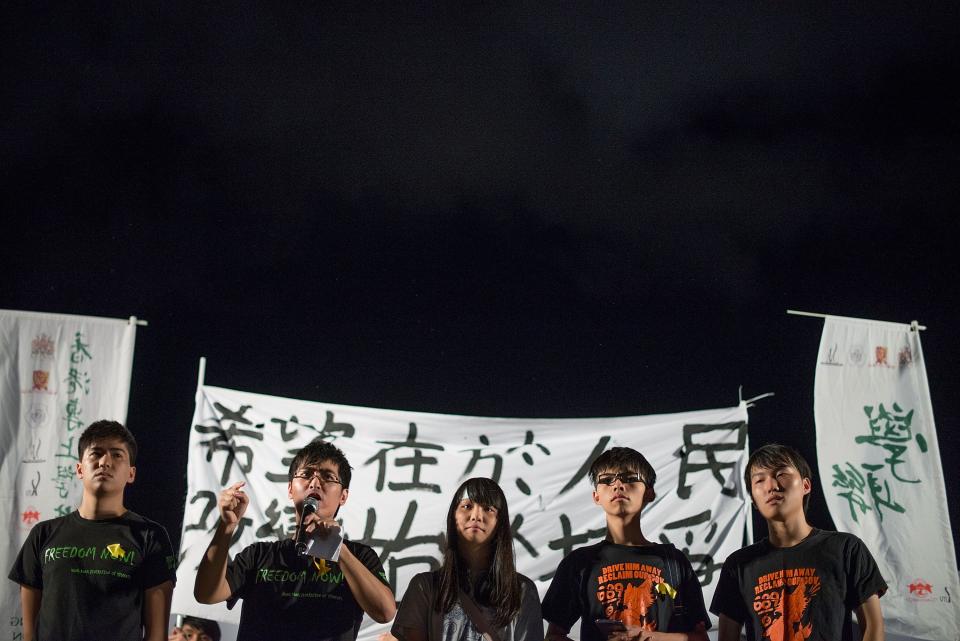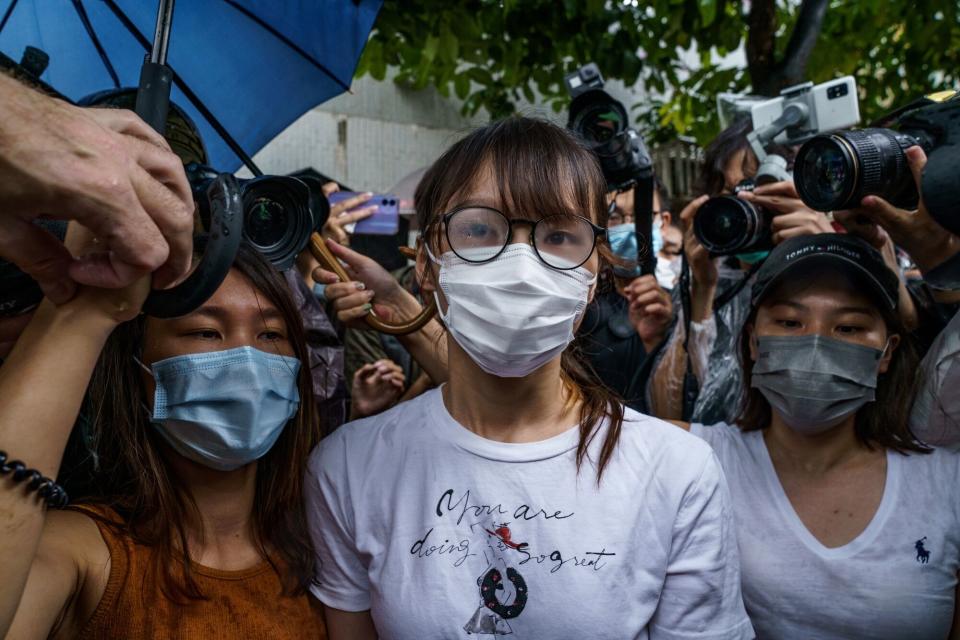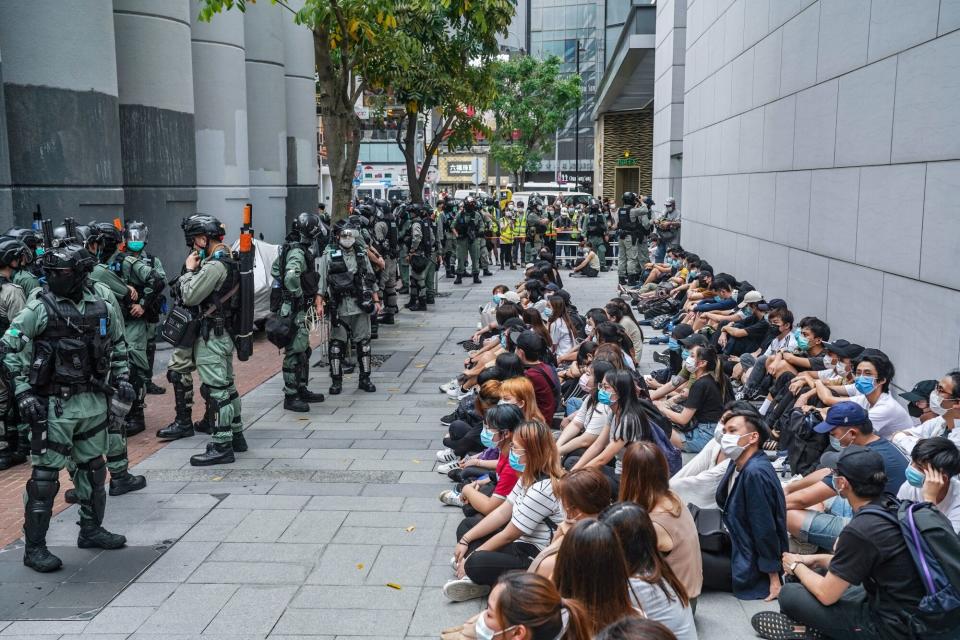Inside Hong Kong’s Secretive Tactics to Muzzle, Discredit Dissent
- Oops!Something went wrong.Please try again later.
(Bloomberg) -- The way Agnes Chow describes it, Hong Kong’s national security police offered her a deal. Renounce her activist past, and she could leave Hong Kong for Canada to study. Reject the offer, and she would remain confined to the city. She took the deal.
Most Read from Bloomberg
JPMorgan Is in a Fight Over Its Client's Lost $50 Million Fortune
Abu Dhabi Is the World’s Newest Wealth Haven for Billionaires
Wall Street Holds Back on Big Bets Before CPI Test: Markets Wrap
The 27-year-old former protest leader last week provided a rare view of the methods used by Hong Kong’s secretive police wing when she detailed in an Instagram post everything she did to get her passport back.
This included an escorted trip into mainland China where she was documented showing her appreciation for the country’s achievements under the Communist Party, as well as writing statements thanking the police and disavowing her past actions. She also pledged to the authorities she would never to return to activism or make contact with other dissidents.
Chow’s comment that she doesn’t intend to return to Hong Kong provoked a strong reaction from officials. Chief Executive John Lee called her "a liar" and "a hypocrite," telling the press on Tuesday that fugitives such as Chow will be “pursued for life unless they turn themselves in,” while a government statement said Chow was “completely devoid of integrity” and urged her to “repent.”
Hong Kong has actively pursued high-profile protesters overseas. In July it placed HK$1,000,000 ($128,000) bounties on the heads of eight democracy activists living abroad.
Before her arrest, Chow was one of the city's best-known female protest leaders in Asia. Due to her fluency in Japanese, she has a large following in Japan where local media dubbed her the "Goddess of Democracy."
For Chow, the risks of returning to Hong Kong were greater than the consequences of jumping bail and becoming a self-exile.
“When I was still in Hong Kong, I was very, very afraid every day” due to the fear of arrest, she told Bloomberg News.
Forcing people to undergo “reeducation” classes and activities is a common tactic used in mainland China, according to Yaqiu Wang, research director for China at Freedom House.
“The Hong Kong government is just taking a page from the CCP’s authoritarian playbook,” Wang said. “Chow’s incident is just the latest piece of evidence of Hong Kong’s mainlandization.”
In response to a request for comment on Chow's allegations and the use of police in accompanied visits to mainland China, Hong Kong authorities pointed to Chief Executive Lee’s comments criticizing Chow's intent to skip bail but declined to comment on specifics of her case.
Chow isn’t alone in denouncing past actions to authorities. The day after she announced her self-imposed exile, local TV station TVB aired a confession from 22-year old demonstrator Tsang Chi-kin, who had pled guilty to several charges including rioting and assaulting police officers. With his face blurred out, Tsang expressed gratitude for access to correctional services' rehabilitation programs.
"It is important to think clearly before doing anything to avoid being incited and instigated by others," Tsang, who was shot by police during the 2019 pro-democracy protests and is currently serving a prison sentence, said on a TV series called 'National Security Law - the Cornerstone of Prosperity and Stability'.
"We and our family members are the only ones who will have to bear the consequences in the end,” he said.
While such tactics may make potential activists think twice, it risks damaging the city’s international reputation and undermining government efforts to restore the city’s position as a thriving finance hub after years of isolation during the pandemic.
“The chilling effect may not help the city's economic ties with foreign companies and investors,” said Yun Sun, senior fellow and co-director of the East Asia program at the Stimson Center think-tank.
The Hong Kong government has taken wide-ranging measures to stifle dissent, including revamping the electoral system to cement China's control by effectively excluding pro-democracy candidates. The result is tumbling participation as residents snub a vote seen lacking political diversity. Local council elections on Sunday drew their lowest turnout in nearly three decades.
The city continues to imprison people for their involvement in the 2019 demonstrations. At the end of last year 522 people were in custody for offenses linked to the protests or the national security law, according to the correctional services department.
Chow said a normal life in Hong Kong was no longer possible for her, despite being out of jail.
In her view, most companies wouldn’t be willing to hire her, banks were unlikely to allow her to open a new account, while any attempt to start a company would be blocked by the government. It was also an isolating existence socially. Chow hadn’t been in contact with other activists or members of her former political party in the past three years, she said.
Leaving Hong Kong doesn’t mean that she left that fear behind. The biggest concern for her now is whether she can live safely overseas given news reports of Chinese security officials working underground in countries such as Canada and the US, she said. “That's why I'm worried about my safety in Toronto.”
Chow said she hasn’t thought of applying for asylum in Canada or other nations and is undecided on her future plans.
She started life as an activist as a teenager, when she joined student-led protests in 2012 aimed at stopping the government from introducing patriotic elements into the school curriculum. She soon became the spokesperson for Joshua Wong’s pro-democracy group Scholarism. That group would be instrumental in the 2014 Umbrella Movement, which saw key sections of the city barricaded by protesters for almost three months, and made Chow and Wong well-known figures.
Two years later, she was one of the founders of political party Demosisto, along with Wong and Nathan Law. She renounced her British citizenship so she could stand in a byelection in the city’s legislative council in 2018, but was barred from participating because of her party’s support for Hong Kong self-determination.
In 2020, Chow was sentenced to 10 months in prison for charges related to unauthorized assembly, and was released in June 2021. She was also arrested in 2020 for suspected violation of the national security law, but was never charged. It was under the shadow of that arrest that police retained her passport.
Despite the government’s protestations against Chow’s decision not to return, the security service are likely to be pleased with the outcome, according to Yun at the Stimson Center.
“The case of Chow would be considered a success for the national police as it is seen as having eliminated a national security threat on the ground,” said Sun. “The fact that Chow jumped bail means she will not return to Hong Kong for the foreseeable future, and someone in exile will not be as effective to promote the political agenda as someone on the ground.”
Chow says she has no regrets about her past actions.
“It's true that I have been suffering a lot because of my participation, but it doesn't mean that what I have done is wrong,” she said. “I mean, if I could have a chance to choose again when I was 15, would I be entering Scholarism? Would I be starting my activism in Hong Kong? I think I would.”
When asked if she would abide by the commitments she made in her repentance letter not to get in touch with her fellow pro-democracy activists and stay clear of politics, Chow said she felt she had “no choice” but to follow instructions and make those pledges.
What the police compelled her to do was a “deprivation of my freedom and of my human rights,” she said, without answering whether she would return to activism in the future.
Her focus now is to heal. Since being released from prison, “I started to have more serious anxiety and PTSD and panic attacks and depression,” Chow said. “2023 was the worst year for me, for my mental health.”
As for leaving her hometown potentially forever, Chow said her feelings are complicated.
“I have a really strong sense of belonging to Hong Kong,” she said. “But at the same time, Hong Kong was a place which brought me a lot of fear.”
Most Read from Bloomberg Businessweek
Rate-Cut Pivot Can’t Come Soon Enough for Debt-Strapped Companies
How the Biggest Boutique Fitness Company Turned Suburban Moms Into Bankrupt Franchisees
Salesforce Signals the Golden Age of Cushy Tech Jobs Is Over
At World Central Kitchen, José Andrés Is in the Middle of a Mess
Hottest Job in US Pays $80,000 a Year, No College Degree Needed
©2023 Bloomberg L.P.






